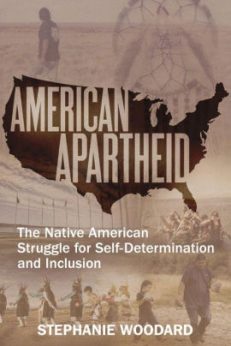
American Apartheid
The Native American Struggle for Self-Determination and Inclusion
- 288 pages
- 5.5 x 8.25 inches
- ISBN: 978-1632460684
- 2018-07-01
17.95
“With its combination of reportage and historical context, Stephanie Woodard’s American Apartheid reveals not only the extraordinary difficulties under which First Americans labor, but also how and why the problems arose. The book also shows us the vital cultures that allow Native people to face their challenges―including their all-important voting-rights struggle―with courage and determination. The United States has enacted many treaties with tribes nationwide, and we must continue to honor these obligations and allow our Native citizens to improve their lives.” ―U.S. Senator Tom Daschle
“I spent my career in political life, which included nearly two decades as a Senator from South Dakota, in service to my state’s citizens, including its Native people. This important book shows us how resilient Native Americans have been and how much adversity they have faced, and are still facing, in working on behalf of their land and people.” ―U.S. Senator Tim Johnson
“In this book, Stephanie Woodard continues her commitment to amplifying Native American voices, highlighting stories of struggle but also of hard-earned progress toward self-determination. Throughout my life in Alaska, I have taken many lessons from Alaska Native communities and leaders, the most important being that when people are free to control their own lands and resources, they control their futures.” ―U.S. Senator Mark Begich
“American Apartheid brilliantly defines the broken system of justice for Native people in the United States.” ―Louise Erdrich, Turtle Mountain Band of Chippewa Indians; best-selling author and National Book Award winner
“I am so happy to see tribal youth―and the cultural continuity they represent―included in American Apartheid’s beautiful photographs and thoughtful, informative text. ―Julie Garreau, Cheyenne River Sioux Tribe; executive director, Cheyenne River Youth Project
“American Apartheid should be required reading for anyone concerned with equality and justice in America. The book is a comprehensive, understandable and shocking insight into the oppression that we Native Americans are still dealing with in the twenty-first century.” ―Michaelynn Hawk, Crow Tribe; director/organizer of Indian People’s Action and Jeannette Rankin Award recipient
“American Apartheid paints a picture of the daily life of Native people that is full of hope. It reminds us, as American Indians, that understanding how to walk in the present requires knowing how and why our ancestors created the path we are on―and that we have a collective responsibility for the wellbeing of our descendants. The stories in this book reflect the relationality, continuity and reciprocity that have always been at the center of social change in Indian country. We will always find a path to revive and survive as nations and cultures.” ―Judith LeBlanc, Caddo; director, Native Organizers Alliance
“Two topics foreign to the mainstream media are immediately noticeable in Stephanie Woodard’s American Apartheid: voter suppression and gerrymandering of Indian reservations―two issues that must be addressed in order to have self-determination and inclusion in Indian country.” ―Tim Giago, Oglala Lakota; editor of Native Sun News Today, founder of Indian Country Today and other publications, and recipient of the Harvard Neiman Fellowship and additional awards
“Whether in regard to history, the land or contemporary culture, hearing the Indian side of the story will alter forever your perspective on this country, and on life itself. It happened to Stephanie Woodard twenty years ago, and ever since she has been helping others who can see, see. This book is a magnificent culmination of her work reporting on people who know what really matters.” ―Christopher Napolitano, creative director, Indian Country Media Network, 2011–2017
“Stephanie Woodard’s deep respect, keen observations and analysis in American Apartheid represent a fresh approach to urgent contemporary issues confronting tribal governments and American Indian people. She meticulously describes large-scale historical forces and the federal and state policies that continue to impede progress in Indian country. These explanations are balanced by first-person accounts: a family grappling with the death of a daughter through a police shooting, an elder’s grief at the despoiling of a treasured river by an abandoned mine, a successful high school suicide-prevention program. The American Indian voices resonate with resilience, outrage and optimism for their children’s lives. Listening could improve all of our lives.” ―Marti L. Chaatsmith, Comanche/Choctaw; interim director, Newark Earthworks Center, Ohio State University at Newark
In recent years, events such as the siege at Standing Rock and the Dakota Access Pipeline have thrust Native Americans into the public consciousness.
Taking us beyond the headlines, American Apartheid offers the most comprehensive and compelling account of the issues and threats that Native Americans face today, as well as their heroic battle to overcome them.
Stephanie Woodard details the ways in which the government curtails Native voting rights, which, in turn, keeps tribal members from participating in policy-making surrounding education, employment, rural transportation, infrastructure projects, and other critical issues affecting their communities. This system of apartheid has staggering consequences, as Natives are, per capita, the population group that is most likely to be shot by police, suffer violent victimization by outsiders, be incarcerated, and have their children taken away. On top of this, indigenous people must also fight constantly to protect the sacred sites and landscapes that hold their cultural memories and connect their spirituality to the nation’s mountains, plains, waterways, and coastlines. Despite these many obstacles, American Apartheid offers vivid pictures of diverse Native American communities that embody resilience, integrity, and the survival of ancient cultures. Featuring photos of Native American life by Joseph Zummo.
For nearly two decades, Stephanie Woodard has reported on Indian country for a variety of publications. The numerous awards she has received include the Richard LaCourse Award for Investigative Reporting, the top annual prize of the Native American Journalists Association, where she is an associate (non-Native) member. The Fund for Investigative Journalism and George Polk Center for Investigative Reporting are among the major journalism organizations that have supported her work.
